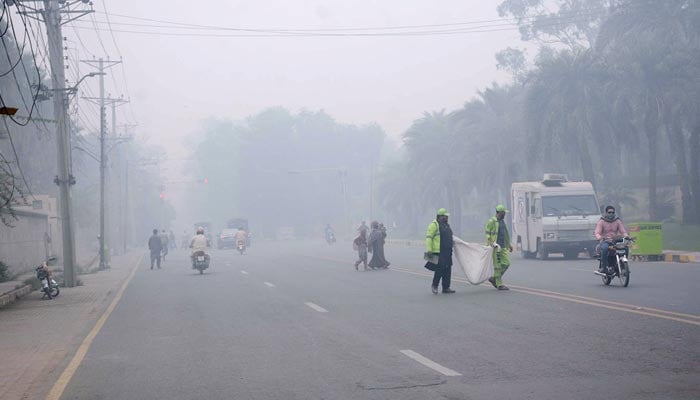Smog to have 'devastating effects' on young kids, pregnant women in Punjab: Unicef
More than 11 million children under the age of five are exposed to toxic air, says Unicef's Pakistan representative
Severe smog that has engulfed some cities of Punjab, including Lahore, in the past couple of weeks will have "devastating effects" on young children and pregnant women, Unicef Representative in Pakistan Abdullah Fadil said on Monday.
Expressing concern over the health of children, Fadil said that more than 11 million children under the age of five are exposed to toxic air.
Different cities of Punjab, including Lahore and Multan, have continued to battle with toxic smog for the past couple of weeks despite various mitigation measures taken by the provincial government as the level of pollutants in the air rises with the drop in temperatures.
The situation has led to hundreds of people being hospitalised including dozens of children with air pollution so severe that it is now visible from space.
Keeping in view the situation, the authorities restricted all outdoor activities in Lahore, including school closures and a ban on entry in parks and other open-air public places last week.
Earlier today, the provincial government also banned all outdoor activities in Multan, Gujranwala, and Faisalabad, the most affected districts after Lahore, till November 17.
"Prior to these record-breaking levels of air pollution, about 12% of deaths in children under five in Pakistan were due to air pollution. The impact of this year’s extraordinary smog will take time to assess but we know that doubling and tripling the amount of pollution in the air will have devastating effects, particularly on children and pregnant women," Fadil said.
He emphasised that young children are most affected as they have smaller lungs and lack the immunities that come with age. "They also breathe twice as fast as adults and take in more air, often through the mouth, along with pollutants, leading to life-threatening respiratory diseases."
The Unicef representative further said that the potential impact of air pollutants could be extreme on babies’ developing lungs and brains as breathing in particulate air pollution can damage brain tissue and undermine cognitive development – with lifelong implications and setbacks.
"When pregnant women are exposed to polluted air, they are more likely to give birth prematurely, face respiratory issues, and their babies may have a low birth weight," he added.
Fadil said that the organisation was supporting awareness measures as part of the Punjab government's official plan to reduce the smog, adding that it was also advocating and working with government departments to reduce emissions, deploying strategies such as transitioning to renewable energy.
“COP29 provides a real opportunity for governments to transform words into climate action before it’s too late. We cannot afford to let our babies breathe toxic air. We cannot let the health, education and well-being of millions of children suffer. For the sake of our children and their future, we must take urgent action today," he stressed.
-
Imagine Dragons star, Dan Reynolds recalls 'frustrating' diagnosis
-
Selma Blair explains why Multiple Sclerosis 'isn't so scary'
-
Can brain stimulation make people kinder & less selfish? New study offers hope
-
Mariah Carey details 'hardest' bipolar disorder experience
-
Pink reveals health routine for asthma management
-
Gigi Hadid talks about 'relieving tension' amid having Hashimoto's disease
-
Selena Gomez explains why she thought lupus was 'life-or-death'
-
How Kim Kardashian made her psoriasis ‘almost’ disappear












